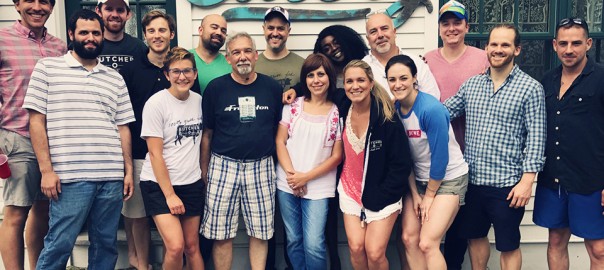I usually like to keep my business life separate from my personal life, but for some reason, I recently felt compelled to share a quick update on life and work on Facebook. The response has been great, so I thought I’d share with the ButcherBox family as well.
In the last four years, I’ve experienced a great deal.
I have started a company, dropped out of college, closed down a company, started another company, and read a lot of books. My hope is that sharing the key things I’ve learned may be valuable.
Knowledge is worthless unless shared.
You can divide my 26 years on this earth into two periods. The time before I dropped out of college and that after I dropped out. I dropped out after my junior year; I was 22 and it was summer. I had just turned down an internship with Ford because I wanted to focus on growing my startup.
Instead, I moved from Wisconsin to Boston and brought my two co-founders with me. We were at a stage where we had hacked through the jungle for two years without success. It was a humbling experience. We were pushing a boulder uphill and I was too naïve to admit it; the business we were hoping to build could not work.
Eventually, they moved on from the startup — as they should have — and I was back to where I was when this all started at age 19. Except, this time, I had nothing in a bank account and was now 24-years-old.
At this point, I had to decide whether to go back to school and get my degree or to continue in the startup world. Everyone I talked to agreed that I should get my degree, after all, I only had one year remaining. So I re-enrolled and chose some classes. About a month before school was going to begin, there was something that just didn’t feel right. I felt like I was going backward not forwards.
The thing was, I wasn’t ready to go back.
So I shopped myself around the job market and got a few offers. One was a way to help cancer patients, one was a startup hoping to disrupt the airline industry, and another was this radical idea to sell grass-fed beef through the mail.
If you haven’t figured it out yet, I eventually decided to sell grass-fed beef in the mail at ButcherBox.
Why? Because of the company’s founder, Mike Salguero.
Mike was someone I knew and trusted. He was my go-to advisor with my first company. I was confident that I would learn a ton from working with Mike, and, even if the business went nowhere, it would be a valuable experience.
There’s a key lesson here: Don’t make decisions around money, make decisions around opportunities to learn. I never got into ButcherBox thinking I’d one day make a bunch of money, far from it.
Fast forward nearly two years to today and I am happier than ever. I haven’t made a bunch of money, but I have learned a lot, a lot a lot. This business could collapse tomorrow and I’d be fine, I’d be happy; because it’s been one hell of a ride so far.
And so, here are the six more valuable lessons that I have learned up til now, having grown a lot since dropping out and being a co-founder twice:
1. Life is all about how we treat each other.
2. When it comes to work, follow the advice Bill Belichick got from his dad Steve, “Keep your head down, work hard, keep your mouth shut.” Be humble. Nobody likes a show-off.
3. Self-care is extremely important. To be your best you need to feel your best. This means taking care of yourself. Make time to work out, eat healthily, and spend time with friends. You are doing your friends, family, and work a disservice if you don’t first take care of yourself first.
4. There is only one YOU. You are unique. Only you know what makes you happy. Not your parents, not your friends, not your boss, YOU. So make your own decisions and believe in yourself.
5. Read books. They open new worlds and can teach you how to live a better life. I attribute a lot of my recent success to two books, Traction by Justin Mares and Guide To the Good Life by William Irvine. The former is about marketing; the latter about philosophy.
6. Talk less, listen more. By listening, you show respect, learn, and become more likable.
So on that note, I’d love to hear from you. What do you feel compelled to share? Thanks for reading.





